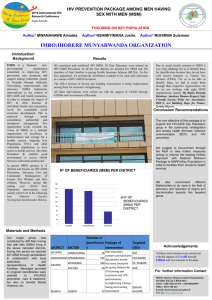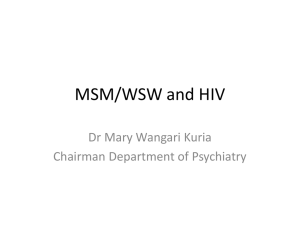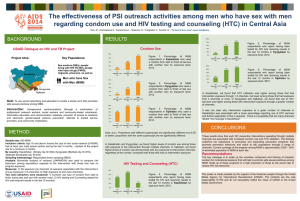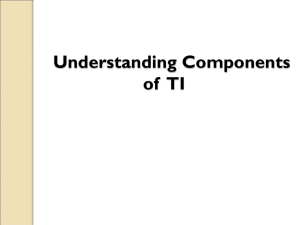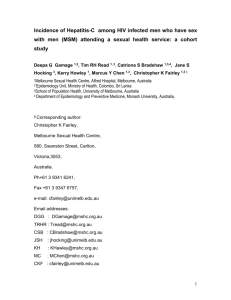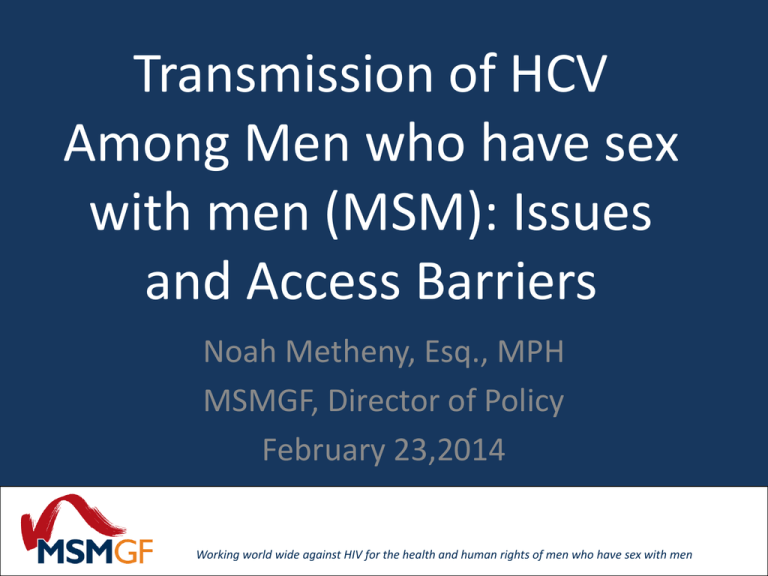
Transmission of HCV
Among Men who have sex
with men (MSM): Issues
and Access Barriers
Noah Metheny, Esq., MPH
MSMGF, Director of Policy
February 23,2014
Working world wide against HIV for the health and human rights of men who have sex with men
Transmission of HCV in MSM
• Transmission through blood-blood contact
• Most transmission occurs from injection drug use
• Growing evidence-base of sexual transmission of HCV among
MSM living with HIV
• Research highlights that MSM who engage in unprotected
anal sex while experiencing skin tearing and/or genital ulcer
disease (e.g. herpes lesions) are at greater risk for HCV.
• Additional factors believed to increase risk of sexual
transmission include unprotected anal sex, group sex, fisting,
and cocaine/methamphetamine use
Working world wide against HIV for the health and human rights of men who have sex with men
New data on MSM and HCV coinfection
• Previously, sexual transmission of HCV was
thought to be rare
• However, new research shows that HIV coinfection with HIV may increase the risk of
HCV transmission among MSM
• Reports of outbreaks of sexually transmitted
HCV among HIV+ MSM in Europe, US, and
Australia
Working world wide against HIV for the health and human rights of men who have sex with men
New (limited) data on MSM and
HCV co-infection: USA
• In New York City, Mount Sinai evaluated 74 HIV+ MSM
who tested positive for HCV and reported no history of
injecting drugs from 2005-1010 (1)
• In 2006, the Miriam Hospital Immunology Clinic in
Providence, Rhode Island started testing all HIV+ patients
for HCV. During the first six months, they found a 9%
prevalence rate among the 150 HIV+ MSM patients it
tested. (2)
Working world wide against HIV for the health and human rights of men who have sex with men
New (limited) data on MSM and
HCV co-infection: Europe
• Dutch study increased change in HCV seroprevalence
among HIV+ MSM from 1%-4% in 2000 to 21% in
2008 (3)
• Overall European HCV prevalence is 6.6% among
HIV+ MSM, with a prevalence of 7.2% in the UK (4)
• Overall HCV prevalence among HIV- MSM remains
low and comparable to that of the general
population
Working world wide against HIV for the health and human rights of men who have sex with men
US Guidelines
• All MSM be vaccinated for HAV and HBV
• All MSM screened and tested for chronic HBV
on an annual basis at the very least
• Testing for HCV is recommended only for MSM
who engage in high-risk sex (e.g. unprotected
anal sex with multiple partners) and/or MSM
who are living with HIV
Working world wide against HIV for the health and human rights of men who have sex with men
Guidelines and recommendations
• Generalized viral hepatitis programs vary
greatly from country to country depending on
resources available for addressing the disease
• Guidelines specifically for viral hepatitis and
MSM are not widely available, as few
studies outside the Global North have been
conducted on this issue
Working world wide against HIV for the health and human rights of men who have sex with men
What needs to happen next…
• Given that MSM are disproportionately affected by
viral hepatitis and that the long-term health effects
of HBV and HCV contribute to high morbidity and
mortality among MSM, more efforts are needed to
address hepatitis among MSM
• Global advocates, donors, program managers, and
policymakers can mobilize to support the following 5
priorities…
Working world wide against HIV for the health and human rights of men who have sex with men
#1: Better access & coordination
for screening/treatment
• Screening and treatment for HCV should be
included as part of the minimum service
package for MSM
• This may entail a stronger referral network
across health facilities as well as a push for
stronger screening and testing policies
worldwide
Working world wide against HIV for the health and human rights of men who have sex with men
#2: Capacity building of health
professionals in hepatitis
• Health professionals working with MSM need
to be provided training and education around
viral hepatitis and co-morbidity of HIV
• This is especially important given recent
research highlighting that sexually
transmission of HCV is not as uncommon as
previously thought
Working world wide against HIV for the health and human rights of men who have sex with men
#3: Mobilize MSM communities
• MSM communities will require resources and
capacity building to develop and mobilize
innovative public health prevention models to
educate their own communities about viral
hepatitis and HIV co-infection
Working world wide against HIV for the health and human rights of men who have sex with men
#4: Advocate for affordable HCV
medications
• Current costs for lifesaving medications to treat HCV
are prohibitive and create extreme barriers to access,
especially in low- and middle-income countries
• Both MSM and non-MSM communities alike, as well
as national governments and multilateral agencies
such as the WHO, must push pharmaceutical
companies to reduce their prices to an affordablelevel
Working world wide against HIV for the health and human rights of men who have sex with men
#5: Fill research gaps
• We currently have far too little information or
funding support regarding MSM and hepatitis
and HIV/hepatitis co-infection
• We both need to deepen and broaden the
research agenda and increase our knowledge
base to improve programs and policy
Working world wide against HIV for the health and human rights of men who have sex with men
Conclusion
• At a starting point to ensure that hepatitis/HIV co-infection is
part of the global conversation about the wellness of gay men
and other MSM
• Despite disproportionate burden of disease on MSM and the
deleterious health consequences of viral hepatitis, there is still
relatively low awareness and understanding of the disease
among both MSM communities and global health donors
• In light of new funding streams to support comprehensive HIV
prevention and treatment targeting gay men and other MSM,
greater efforts are needed to support and integrate viral
hepatitis into ongoing global HIV programming and policy efforts
Working world wide against HIV for the health and human rights of men who have sex with men
References
(1) Daniel Fierer, M.D., et al. Sexual Transmission of Hepatitis C Virus
Among HIV-Infected Men Who Have Sex With Men—New York City,
2005-2010, MMWR, July 22, 2011, vol. 60, no. 28.
(2) L.E. Taylor, M.D., et al. Acute Hepatitis C Virus in an HIV Clinic: A
Screening Strategy, Risk Factors, and Perception of Risk, AIDS Patient
Care and STDs, Volume 25, 2011.
(3) Urbanis, Anouk, et al. Hepatitis C virus infections among HIVinfected men who have sex with men: an expanding epidemic. AIDS
2009 Vol 23 No 12, F1-7.
(4) Daniel Bradshaw, et al. Sexually transmitted hepatitis C infection:
the new epidemic in MSM? Current Opinion in Infectious Diseases: Feb
2013, Vol. 26, Issue 1, pp. 66-72.
Working world wide against HIV for the health and human rights of men who have sex with men

